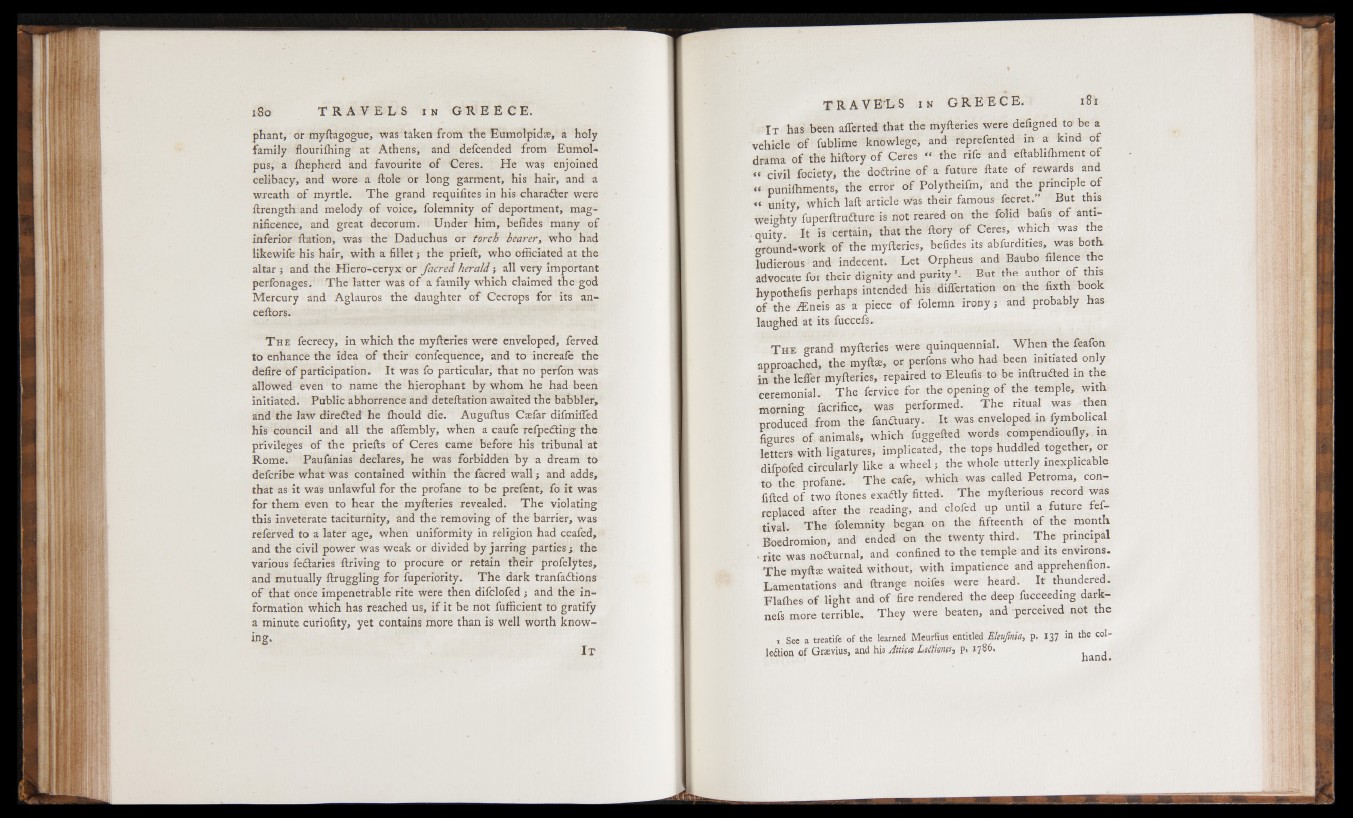
phant, or myftagogue, was'taken from the Eumolpidse, a holy
family flourilhing at Athens, and; defeended from Eumol-
pa si a fhepherd and favourite of Ceres. He was enjoined
celibacy, and wore- a ftoie or long garment, his hair, and a
wreath of myrtle. The grand requifites in his character were
ftrengthand melody of voice, folemnity o f deportment, magnificence,
-and great decoram. i Under him, hefides many of
inferior ilatiotti was the Daduchas or torch bearer, who had
lifcewife his hair, with a fillet; the prieft, who officiated at the
altar j and the Hiero-ceryx or facred herald y all very important
perfonages;1 The latter Was o f a family which claimed the god
Mercury and Aglauros the daughter o f Cecrops for its ari-
ceftors.
T he fecrecy, in which the myfteries were enveloped, ferved
to enhance the idea of their cónfeqüence, and to irrereafé the
defire o f participation. It was IS particular, that ïro perfón wak
allowed even to name'the hierophant by whom he had been
initiated. Public abhorrence and deteftation awaited the babbler,
and the law directed' he Öiould die. Auguftus Csefar difmifiéd
h!S; Council and all the aflembly, whén a caufe refpetfring‘ the
privileges- of the priefts of Ceres came before his tribunal at
Rome. Paufanias declares, be was forbidden by a dream to
deferihe what ’fvaS contained within thefacted wall; and adds,
that as it was unlawful for the profane to be prefent, la it was
for them even to hear the myfteries revealed. The Violating
this inveterate taciturnity, and the removing of the barrier, was
referved to a later age, when uniformity in religion had ceafed,
and the civil power was weak or divided by jarring parties y the
various fedtaries ftriving to procure or retain their profelytes,
and mutually ftruggling for fuperiority. The dark tranfa&ioos
o f that once impenetrable rite were then difclofed y and the information
which has reached us, i f it be not fufficient to gratify
a minute curiöfity, yet contains more than is well worth knowing*
I r
iSk
I t has been affefted that the myfteries were defigned to-be a
vehicle o f fublime kndwlege, and reprefen ted; in-a kind of
drama of the hiftory of Ceres W the rHe and eftabliihment of
<c civit focfcty, the do&rine o f a future ftate of: rewards and
“ 'puiiifhments, the err©? of Polytbeifm, and the principle of
« unity; which laft artrold vriis their famdus feeret.” But this
weighty fu p e tftra& u c e r is ifo t reared on the fblid bafis o f an ti-
*qufty It ie certain, that the 'fteriyof Ceres, which was the
gro u n d -w o rk o f the myfteries, befides its abfurdities, was both,
ludicrous and indecent. Let Orpheus and Baubo filence the
advocate for their dignity and purity |§
hypothefis perhaps intended his -difiertation on the fixth book
o f th e iEneia as a piece of fblemh irony y and probably has
laughed at its fuccefs.
T he grand myfteries were quinquennial. When the feafon
approached, the myft®, or perfons who had been initiated only
in thelefier myfteries,:repaired to Eleufis to-be inftruded m the
ceremonial. The fervice for the opening o f the temple, with,
morning facrifice, was performed. The ritual was then
produced from the fanftuary. I t was enveloped in fymbolieal
figures i©£) -animals, which fuggefted words compendioufly,, in
letters-with-ligatures, implicated; rite tops huddled together, or
difpofed circularly like a wheel; the whole utterly inexplicable
to the profanel The cafe, which was called Petroma, con-
fifted of two ftones exaaiy fitted. The myfterious record was
replaced after the reading, and clofed up until a future fef-
tivak The folemnity began on the fifteenth of the month
Boedromion, and- ended on the twenty third. The principal
- rite was noCturnal, and confined to the temple and its environs.
The myftse waited without, with impatience and apprehenfion.
Lamentations and ftrange noifes were heard. It thundered.
Flalhes of light and of fire rendered the deep fucceeding dark-
nefs more terrible. They were beaten, and -perceived not the
i See a treatife of the learned MeurSus entitled Eleujinta, p. 137 in tfie coit
i o n of Grsevius, and his Attica Lcftims, p, 1786. hand